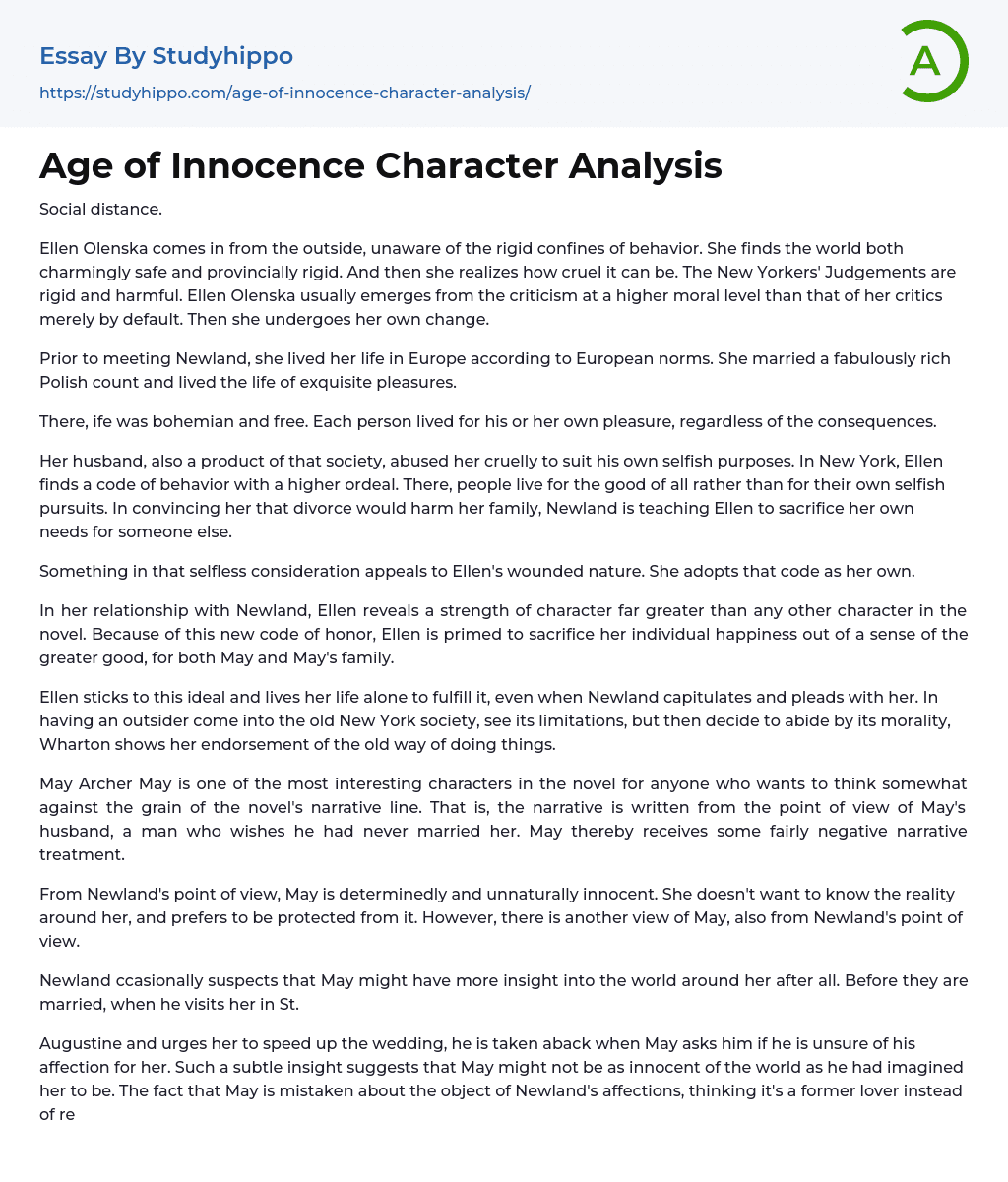Social distance.
Ellen Olenska comes in from the outside, unaware of the rigid confines of behavior. She finds the world both charmingly safe and provincially rigid. And then she realizes how cruel it can be. The New Yorkers' Judgements are rigid and harmful. Ellen Olenska usually emerges from the criticism at a higher moral level than that of her critics merely by default. Then she undergoes her own change.
Prior to meeting Newland, she lived her life in Europe according to European norms. She married a fabulously rich Polish count and lived the life of exquisite pleasures.
There, ife was bohemian and free. Each person lived for his or her own pleasure, regardless of the consequences.
Her husband, also a product of that society, abused her cruelly to suit his own selfish pu
...rposes. In New York, Ellen finds a code of behavior with a higher ordeal. There, people live for the good of all rather than for their own selfish pursuits. In convincing her that divorce would harm her family, Newland is teaching Ellen to sacrifice her own needs for someone else.
Something in that selfless consideration appeals to Ellen's wounded nature. She adopts that code as her own.
In her relationship with Newland, Ellen reveals a strength of character far greater than any other character in the novel. Because of this new code of honor, Ellen is primed to sacrifice her individual happiness out of a sense of the greater good, for both May and May's family.
Ellen sticks to this ideal and lives her life alone to fulfill it, even when Newland capitulates and pleads with her. In having an outsider come
into the old New York society, see its limitations, but then decide to abide by its morality, Wharton shows her endorsement of the old way of doing things.
May Archer May is one of the most interesting characters in the novel for anyone who wants to think somewhat against the grain of the novel's narrative line. That is, the narrative is written from the point of view of May's husband, a man who wishes he had never married her. May thereby receives some fairly negative narrative treatment.
From Newland's point of view, May is determinedly and unnaturally innocent. She doesn't want to know the reality around her, and prefers to be protected from it. However, there is another view of May, also from Newland's point of view.
Newland ccasionally suspects that May might have more insight into the world around her after all. Before they are married, when he visits her in St.
Augustine and urges her to speed up the wedding, he is taken aback when May asks him if he is unsure of his affection for her. Such a subtle insight suggests that May might not be as innocent of the world as he had imagined her to be. The fact that May is mistaken about the object of Newland's affections, thinking it's a former lover instead of realizing it is Ellen Olenska, does not take away from the insight. May recognizes that Newland is cting out of insecurity.
When he answers her glibly, she goes back to the happy ideal of a love-filled engagement. Later, after their marriage, it becomes open to speculation what May knows and what knowledge she might be
acting on.
After he makes contact with Ellen Olenska again, a year and a half after their marriage, Newland notices a change in May. Before their marriage, May was Ellen's champion, not noticing anything wrong with Ellen's socially unacceptable choices. Afterward, May becomes a vehement critic of her cousin. A couple of times, Newland notices that May seems to be crying.
Finally, May seems to have contrived the final separation of Newland and Ellen by the story of her pregnancy. Just before they are about to consummate their long love affair, May tells Ellen she is pregnant. However, it is not until weeks later that May goes to the doctor to confirm her pregnancy. The suggestion is that May is exercising her power without flexing it.
She knows that this is the only acceptable to way to confront the situation without confronting it. A modern reader might call it passive-aggression. In the context of New York society, it is merely coping
- Boo Radley essays
- Genesis essays
- Richard iii essays
- Alice in Wonderland essays
- On the road essays
- Ozymandias essays
- The Nightingale essays
- Holden Caulfield essays
- Animal Farm essays
- 1984 essays
- A Hanging essays
- Shooting An Elephant essays
- A Tale Of Two Cities essays
- Adventures Of Huckleberry Finn essays
- Arthur Conan Doyle essays
- Brave New World essays
- Characters In Hamlet essays
- Characters In Romeo And Juliet essays
- Desdemona essays
- Diary Of A Wimpy Kid essays
- First-Person Narrative essays
- Frankenstein essays
- Heart Of Darkness essays
- Jane Eyre essays
- Jay Gatsby essays
- King Duncan essays
- Librarian essays
- Little Red Riding Hood essays
- Lord Of The Flies essays
- Silas Marner essays
- The Cask Of Amontillado essays
- The Catcher In The Rye essays
- The Crucible essays
- The Handmaid's Tale essays
- The Reader essays
- Virgil essays
- Wuthering Heights essays
- Candide essays
- Castle essays
- J. D. Salinger essays
- Ulysses essays
- Ethan Frome essays
- In Cold Blood essays
- Outliers essays
- Tuesdays With Morrie essays
- The Art of War essays
- Wife of Bath essays
- Huckleberry Finn essays
- The Lady With The Dog essays
- Great Expectations essays




